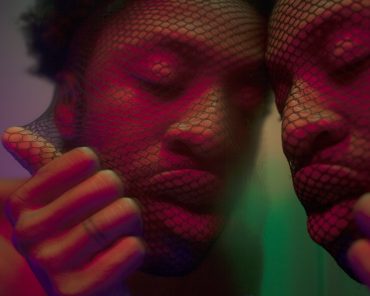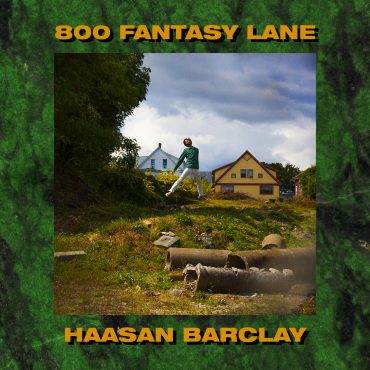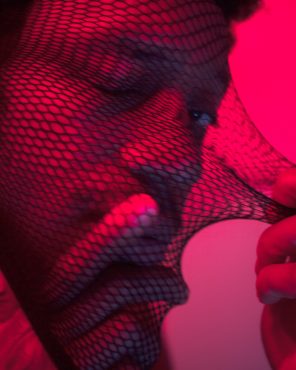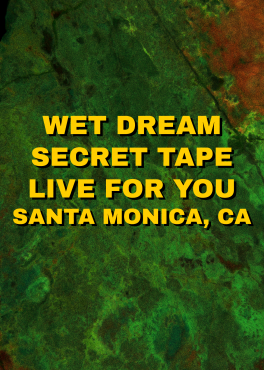
Before the release of his 2016 LP Heaven is Your Last Dream, Haasan Barclay had begun making a name for himself around Boston’s hip-hop and R&B scene as a producer, working with artists like Michael Christmas, OG Swaggerdick and more. Now, nearly a year-and-a-half since that release, he’s returned with a new EP, entitled 800 Fantasy Lane, coming out November 14th. This new project sees the singer-songwriter delve further into a psychedelic rock sound that his recent work has been hinting at.
Recently, Haasan sat down with Allston Pudding to discuss the inspiration behind his new music, the relationship between music and video, as well as the impact that a diverse palette of influences has on his overall vibe. Listening to him speak about his multi-faceted creative efforts – which extend beyond music — it is clear that he approaches each project with a deeply-ingrained creative passion.

The cover to 800 Fantasy Lane
Allston Pudding: You’ve been working on a lot of new songs that go back awhile, almost ten years, in some cases.
Hassan Barclay: “Wet Dream,” the music for that was redone. I went back and thought about the 3 people in the band. I was playing guitar, my friends Andrew and Alan were playing bass and drums… The whole idea behind making the new version of it was to take the energy that they put into it. Kind of like the ghost of the old song, and channel their energies into it.
AP: Although the drums are sampled, how were you able to give them the energy of live drums?
HB: I played them on a machine, but the feeling behind them is real. I tried to make it as lifelike as possible, but it’s also synthesis. It’s like how you paint a picture. I’m basically painting with the drums, that’s how I try to look at it. It’s like photorealism with the drums, then I can do abstract stuff with it later.
AP: Do you see the drums, then, as the anchor of a track, or the center, and you can go out with other instruments as far as you need?
HB: Yeah, it can be. It really depends on the track. Sometimes I just come up with the melody first, and the song is done in my head. Then it comes down to me translating it later. Maybe I want it to be this genre or that genre. Maybe this trap track that I have in my head can be a bachata track.
AP: You cast a very wide net of genres, and your past few releases have seen you dive further into a psychedelic rock sound. How do you balance that spread of genres while also trying to create a consistent sound for an EP?
HB: I just go off of how I feel. If I’m feeling like I wanna make an industrial trap song, that’s the mood I’m in, and I’m thinking about the words, and it all comes together, I’ll just make that. But if I wanna make a boom-bap beat today, I’ll make that and send it to my friend who’s the best boom-bap rapper. It’s all about the context. I think that’s really important going forward. Especially the way the world is now. You can do whatever you want musically. I feel like not enough people take advantage of that. Identity is such a fluid thing now, and I try to bring that into my music. I think a lot of rappers coming out now are really in tune with that. Lil Uzi Vert is definitely in tune with that. He makes like hard-ass Good Charlotte songs.
AP: Can you break down your own song-making process?
HB: Over time, I realized that I only work in certain seasons. Right after I finish a project, I have to take time out and gain motivation. I had a friend who told me after Heaven is Your Last Dream, “You’re in a mode where you have to absorb now. You have to take in the world and you take that influence in.” Then by the time I feel like I’ve had enough of that, I can either come up with a melody or a drumline or something in my head, and it formulates into a whole song. Or I’ll see something and a whole song just pops into my head. Or I’ll think of a phrase and write it down in my notes. I’ve built a lot of mechanisms to write music with or sprout an idea from.
AP: Outside of musical influences, what are some other art forms that inform your work?
HB: I love film. Quentin Tarantino is one of my favorite directors, even though he’s kind of a shithead. I love Stanley Kubrick, because I see a lot of myself in what he did with movies. He was really intricate. He was controlling every single minute detail that got into the movie. I feel like I do the same thing with my music. I try to look across different art forms and see myself in other people. Emotionally, I feel that way about Francis Bacon… his stuff is nightmarish.
I like understanding [how others work], because it makes me understand how I work better. Some people need to be in a situation like they’re in complete stress. Surrounded by a certain type of stress so they can create what they need to get their feelings out. I feel like sometimes I get there. Lyrically, I feel like I can really get the best out of a bad situation. I think that comes through in “Wet Dream.” So I like seeing how other people work so I can mirror it onto myself and see, from my experiences, if I can adapt that into what I do.
AP: What made you rework an older song like “Wet Dream” and how did you decide that it could work with newer material?
HB: I wanted to make something that was really cohesive. The first album was the opposite of that. [Those songs] work together seamlessly, but it wasn’t exactly cohesive. So I wanted to basically prove to myself that I could do that. I could do something really strong and direct. I’ve had dozens of projects before that never got released, but they’ve always been things to prove to myself that I could do this or that. That’s another thing that pushes me to make music in general. I look at it like sociology and then therapy. I try to study as much as I can about the world and everything around me and relate it to myself. Then I pour all my emotions and thoughts into the music.
“Wet Dream” is a reflection of that. I wrote it in a situation when I was pretty depressed, and I think it reflects that pretty well. But I’m also into multiple interpretations. So you can see it as a teenager trying to profess his love to someone and not wanting them to leave. I really like playing with interpretation. It’s like giving riddles to people. But they don’t necessarily have to get what I’m going for. They can get whatever they want.
AP: What are the ways you play with that idea on the EP’s other tracks?
HB: “Secret Tape” is very direct. It’s teenage lust and very upfront about it. I’d never done something that sexualized. We’re working on a video for that. Then there’s “Live For You.” That was the first single. I really enjoyed making it because I proved to myself I could make a really heartfelt love song for Liv [Slaughter].
I was heavily influenced by the New Edition biopic. It’s amazing, but it’s super long. It’s pretty interesting because I grew up in Boston, and they’re from around here. But they were very close to my family. They grew up together. Just seeing them blow up like that and be on Michael Jackson-level was crazy to me. Then seeing the biopic just reinvigorated the feeling in me to where I want to push my voice as much as I can. I’m gonna make a song that’s super-simple, two chords, and just belt it out.
I love talking about “Santa Monica,” it’s just such a wild story. It’s another instance of interpretation. You can take it pretty literally, like “yesterday I got too high.” We were on Santa Monica Beach. We went to the pier on a Sunday, and it was super-packed, and I was super uncomfortable, so we left. But as we were going back, we saw this guy with a gaping head wound, eyes rolling back in his head, but his friends were just around him chilling like it’s cool. Then we saw a guy have a seizure. I don’t know if he was okay.

“I had never done something that sexualized.”
AP: Okay, wow, I definitely didn’t pick up on that. It sounds like a groovy beach song, but it’s much darker than that.
HB: Then we saw a dude on the beach literally praying to the sun. That’s where the hook comes from. I’m really happy with how the EP sounds. “The Trip” was another track from about 10 years ago. It was a weird shoegaze track when I first made it. Then I got my boy Tyler and my boy Kaan [Erbay] on it and they made it a little more Radiohead-ish, and I really like that.
AP: You’ve done a lot of film, directing music videos for yourself and others. Where do you see that intersection of film and music?
HB: I definitely want to get into directing feature films at some point. That’s something I’ve always wanted to do since I was like a baby. Seeing Toy Story as a kid, I was like, “I wanna make a movie!” I think the intersection of film and music is a very important part of life.
AP: How easy is it for you to step back from a song or a visual piece and see the bigger picture of how to connect the two?
HB: When I’m writing songs, I’m already thinking of visuals for it. What the visual is for that song. “Santa Monica” sounds like a sunny beach. “Wet Dream” kind of sounds like a school night to me. A lot of dark greens and purples. I think of a lot of tones, too. Colors and tones. The sound tones kind of go together for me. “Wet Dream” is very blue and purple and green. But so is “Live For You.” “Secret Tape” is very red. I try to think of a visual component while I’m making the music. When I’m making a song, it’s like I’m directing a movie. Kind of like the same way Stanley Kubrick really intricately makes a whole universe in a film, I try to create that in a song.
AP: How do you craft those darker layers underneath a song?
HB: I always leave more for someone who’s paying a little more attention. That’s something I’ve always liked about music. I would listen to bands and hear more in it as I listened to it. I listened to music obsessively when I was little. All I could do was listen to the same five albums while I was going to school. I’d hear the same things but then I’d hear something different that one time, or I’d find a different meaning to the lyrics that one time. And that really stuck with me.
AP: On the EP, did you handle all the recording yourself?
HB: I played everything myself. I wanted to make it stripped down, but also maximalist. “Wet Dream” is like that. It has a lot of my teenage influence. I was obsessed with Incubus when I was little. If you listen to it again, it’ll sound like that. But if you listen to it another way, it’ll sound like a Police song.
AP: Moving forward, will you keep digging up new tracks, or try to make something entirely new? Try to balance between those two ends?
HB: Definitely a balance. I’ve already been doing it, looking back at things I’ve made in the past. It’s still pretty good, but the production quality’s not quite there. I didn’t know how to mix. But the melodies are really good, and I can turn that into something else. But at the same time, I do want to push forward too. That doesn’t mean I can’t push forward with the old stuff and just re-imagine it; but at the same time, I do want to make some completely new stuff. I also want to write for more people, and I can still channel that old stuff into new things, be it film scoring or video game scoring. I’ve always wanted to score a video game.
AP: You’ve produced a lot for other artists in the past. How do you find that compared to pursuing things under your own name?
HB: I try to think of it the same way. When I’m producing for someone else, I try to consult them as much as possible and talk to them throughout the whole process of creating. Even if it’s through email. But I’d rather do it in person, just because it’s more intimate. You can pick up a lot more, you can run with how someone’s feeling, and just steer the song in whatever direction you want. I really like helping someone build a sound. That’s something I’ve tried to do for years with other people. We’re creating a definitive sound for this moment in your life right now.
AP: How do you determine what the main vision for a large project is?
HB: Gut feeling. It’s usually the first hunch. Depending on how much context or understanding I have of a situation or an artist I’m working with it’s usually: “this plus this equals that.” I made this beat after Halloween last year, and I had it for a specific artist. But it went through so many changes. We haven’t found somebody for it yet, but we added an orchestra to it. So now I can look for an artist and be like, “Okay, I know they can make really cool stripper bangers. I’m going to give them this really weird stripper banger that could easily be a hit.”
AP: So you feel like you’ve always had this energy creatively but things like production and mixing are stuff you’ve gotten better at with time?
HB: Creatively, yeah, but technically, I didn’t always know what I was doing. The first album I recorded with an engineer, and it didn’t go the way I wanted it to. So I said to myself, I’m either going to go with someone I really trust or I’m going to do it myself. And I just decided to do it myself. I realized after a while that mixing is really subjective. Of course, you have to know a lot of technical things, but once you get over the hump, it’s really just subjective. […]
After I became cool with it, I started breaking all [the technical rules you learn], and started doing things that were more creative and more true to me. But you definitely have to go through a period where you start learning the fundamentals. Same thing with history. You have to know your history of a lot of things so you can go forward or, at least, have an understanding of where you fit into that history.
AP: That period of learning can be frustrating. How do you avoid getting bogged down in those periods?
HB: There were times where I just didn’t make music. Right after high school, I wasn’t thinking about music at all, really. I was thinking about being a photographer. It was another path for me, but I wasn’t thinking about having multiple paths in my life. I was very impatient about where things were going. I didn’t know I had to put a lot of time into it. I started doing other things. I started skateboarding more. I started shooting photography with skaters. That was a really big thing in my life, but it only ended up being a season in my life.
I left music because I was trying to start a band. The band didn’t work out, so I got into skateboard photography. Then I started hanging around with my cousin and producing for more rappers around that time. That’s how I got back into music. I figured out I had a new path: I could start producing for other people, then work from that and start bringing myself up as an artist, and I think it worked out!
I’ve learned from everyone I’ve ever worked with. Even if I had a bad experience with someone, I’ve always learned from it. I’ve still taken something away from it that I can use for the rest of my life.
AP: What was it that kept you in the mindset to push yourself back on a musical path?
HB: It was really like an identity issue. Like I didn’t know what I wanted to make because at the same time, I had to get over the idea that I had to stay in one lane. But I didn’t realize that there were multiple lanes. I’ve always wanted to mix things, mix genres, mix energies.
I had to learn who I was as a person. I made music from a young age, so puberty was a big part of it. I didn’t know who I wanted to be or who I wanted to project myself as. I would go through different stages. I went through a goth stage, a Marilyn Manson stage, a Nine Inch Nails stage…
AP: So you think there’s a lot of pressure on young people to decide who they are at too young an age?
HB: That was something I tackled head-on my senior year of high school because I was being forced by my teachers and other people to figure out what I wanted to do after high school. But it was like, alright, let me get some space to actually think about what I want to be or who I am as a person. It’s never really about who someone wants to be, it’s about what industry you want to go into or what kind of trade do you want to have or what kind of career do you want to have.
I felt like I needed to know who I was as a person before I could figure any of that out, but no one really wanted to listen to that. I feel like society is fucked up in a way for that reason. I always tell kids, when one says, “I don’t know what to do after school,” I say, “If you have the chance, please just take time off and think about what you want to do with your life.”
AP: Looking ahead, what’s the next level you envision for yourself?
HB: I want to challenge society more with my music. And a more tangible answer: I want to work with Dad Jeans more because he has a lot of crazy music. He’s like a modern day David Byrne. He’s building synths. Physically building them.
AP: What aspects of society do you want to challenge?
HB: I want people to listen to music more intently. On a basic level. I feel like there’s an oversaturation of music that isn’t really that deep. I think I can make people think deeper about things and question things.

The tracklist to the EP.
__________________________________________________
Listen to 800 Fantasy Lane on Soundcloud, and be sure to follow Haasan Barclay to get news on upcoming show dates and video releases!
